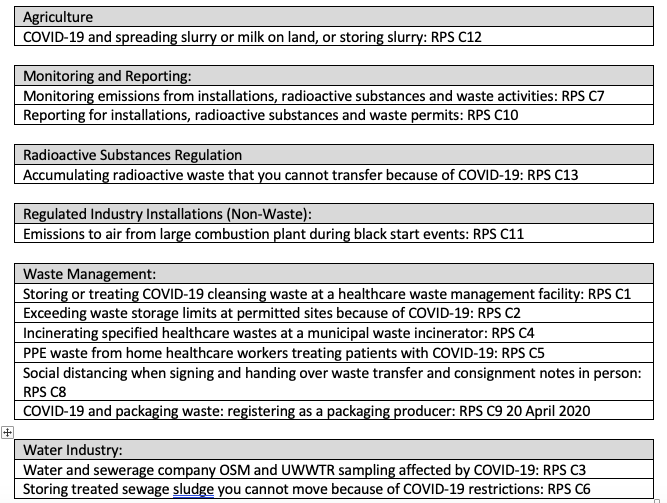Our environmental specialist, Clare Fowell has written an article, for businesses to remind them of their Statutory Environmental Compliance Obligations during COVID-19.
Information on Environmental Permitting from the Environmental Regulators
As the current COVID-19 pandemic continues, there has been uncertainty for businesses in how to manage their environmental compliance obligations whilst coping with all the changes to the usual working environment required for example by social distancing and enhanced hygiene measures which seem likely to remain for some time.
The initial response of the Environment Agency was to look at how to reduce the risk to its staff and anticipating how their work would be impacted by the controls put in place. The staff on the ground were directed to prioritise ‘flood risk and pollution’ and ‘high risk assets and activities’, and also ‘continue to carry out regulatory visits to sites that could cause serious environmental harm where required’ but reduce visits to other sites.
Similarly, the initial response by Natural Resources Wales (NRW) was to protect its staff and to adapt to different ways of working.
Environment Agency – Environmental Permitting
In England, the Environment Agency requested information from some Environmental Permit holders regarding their business continuity plans and what these plans may mean for permitted activities, and whether businesses could foresee any perceived risks through continued environmental protection or compliance with their Environmental Permit.
As a result of the responses received, the Environment Agency has been publishing a range of temporary COVID-19 Regulatory Position Statements (COVID-19 RPSs) to minimise risks to the environment and human health where compliance with specific regulatory requirements is not possible due to COVID-19. If a business wishes to use a COVID-19 RPS, then they must notify the Environment Agency or obtain approval as specified within the particular RPS, and as long as they comply with its requirements then the Agency will not normally take enforcement action.
It is important to note that it is not a general exemption from all environmental regulatory requirements.
As of the 28 April 2020, the Environment Agency had published thirteen COVID-19 RPSs: Natural Resources Wales – Environmental Permitting
Natural Resources Wales – Environmental Permitting
In Wales, NRW has taken a slightly different approach in that they have provided general guidance rather than a series of specific documents.
NRW expect businesses ‘to continue to comply with environmental regulations and their permit conditions’, including ‘developing contingency plans and putting appropriate measures in place to ensure that all reasonable actions are taken to foresee and mitigate any potential issues’.
Where a business is facing problems with permit compliance due to the current situation, they are advised to inform NRW as soon as possible and work with them to find the best solutions.
NRW have provided guidelines for businesses to follow:
- Inform NRW of the issues and how those issues are being managed as early as possible.
- Prioritise compliance with those permit conditions that directly protect the environment.
- Take all practicable alternative measures to prevent and minimise any harm to the environment or risks to public health.
- Keep clear and comprehensive records of the decision made and actions taken.
If these guidelines are followed, then NRW have stated that they ‘will take a proportionate and reasonable approach’ to assessing compliance during this time.
As with England, it is important to note that NRW have stated that they will continue to check and assess compliance, focusing their attention on priority sites, but also ‘using a range of alternative methods for gathering intelligence’.
NRW have provided specific advice on how to temporarily complete waste documentation without signatures (RBB-C19-004: Providing signatures on waste documentation during the Coronavirus pandemic).
What to Do
In both England and Wales, it is important for businesses to be proactive and work with the regulator on meeting environmental compliance obligations to be in the best position to avoid future enforcement action.
An action plan should be established based on business continuity plans and on the regulator’s requirements. This should include consideration of current monitoring and reporting requirements and any improvement conditions within the Environmental Permit.
If you would like more information or help on how to manage your environmental compliance obligations, please contact Clare Fowell at [email protected]




